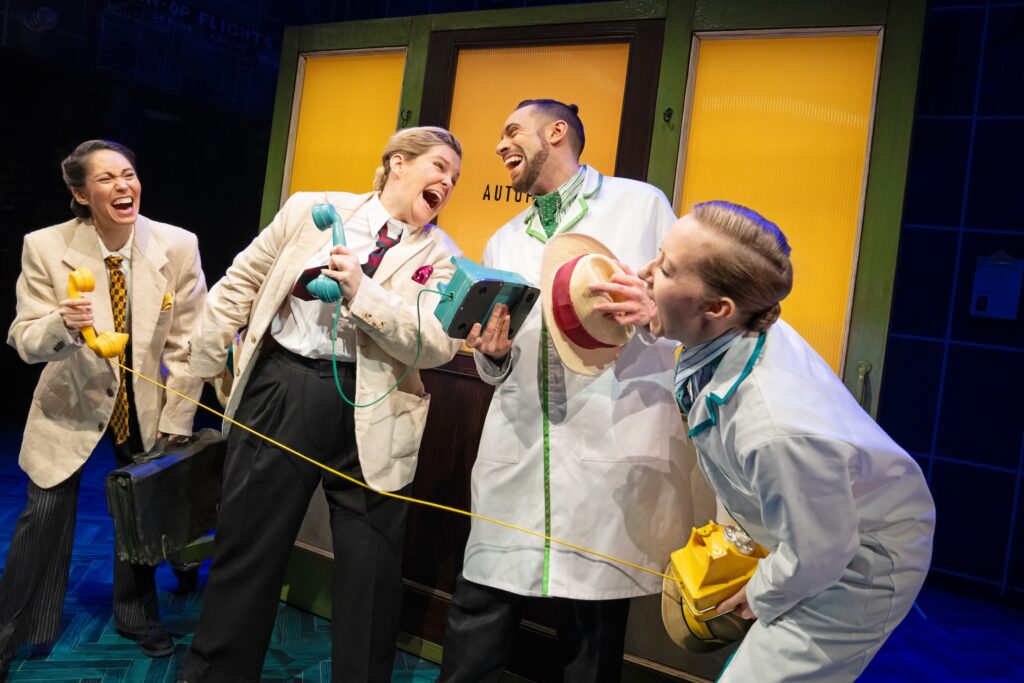From Across the Pond, ‘Operation Mincemeat’ Brings Its Gleeful Irreverence to Broadway
The latest English invasion has roots in a tradition that runs through music hall and Monty Python, and obliterates the line between clever and divinely goofy.

Each theater season, at least a few London productions transfer to Broadway after earning breathless praise and, more often than not, an Olivier Award or two. Last fall’s crop ranged from the superb “The Hills of California,” a searing new play by Jez Butterworth, to “Tammy Faye,” a mess of a musical that couldn’t decide whether it wanted to mock American excess or revel in it.
For a people known for their discretion and reserve, the Brits don’t seem to mind theatrical bombast, particularly when song and dance are involved. Indeed, last autumn’s imports also included an aggressively creepy musical adaptation of “Sunset Boulevard” directed by Jamie Lloyd, whose penchant for superficially stripped-down overstatement has also shaped revivals of Ibsen and Pinter. And let’s not even get started on last spring’s U.K.-based, garish “Cabaret at the Kit Kat Club.”
Fortunately, the latest English invasion has roots in a tradition that’s less precious or histrionic — one that runs through music hall and Monty Python, and obliterates the line between clever and divinely goofy. The screwball comedy in “Operation Mincemeat,” which picked up two Oliviers last year, including best musical, has also inspired comparisons to Mel Brooks, and its pop-informed score and irreverent take on history reminded at least one critic of “SIX,” the London-bred Broadway hit revisiting the wives of Henry VIII.
The history informing “Mincemeat” is more recent: The title refers to a World War II spy mission, in which British intelligence disguised a dead homeless man as a Royal Marines officer and planted documents on him intended to mislead the Nazis about Allied plans to invade Italy. In the musical, we meet dozens of characters as the plot unfolds, ranging from Ewen Montagu, a principal architect of the operation, to James Bond creator Ian Fleming.

Under Robert Hastie’s giddy direction, these parts are all played by five actors — among them David Cumming, Natasha Hodgson, and Zoë Roberts, from the comedy troupe SpitLip, who with fellow member Felix Hagan wrote the book, music, and lyrics. The performers, who also include Claire-Marie Hill and Jak Malone, also take on different genders at various points: Ms. Hodgson’s main character is a comically pompous Ewen, while Ms. Roberts has grand fun as an imperious colonel and a wacky American pilot, both men.
Mr. Malone injects a bit of pathos as Hester Leggatt, a veteran secretary, who sings “Dear Bill,” a valentine to a beau off at war obviously drawn from sad experience. A couple of other moments aim for poignancy, particularly a brief tribute toward the end to Glyndwr Michael, the lost soul who posthumously played a key role in the operation dressed as Major William Martin — or “the man who never was,” as he’s remembered.
Such glimmers of sobriety only underline the gleeful irreverence that informs most of the dialogue and musical numbers. One of the latter, “Das Ṻbermensch,” opens the second act with a parade of dancing Nazis, their choreography as energized and organized as that of a modern K-Pop group.
I’ll admit I didn’t find that number quite as funny as “Springtime for Hitler” was in “The Producers,” either in the film or the stage musical. Nor, for that matter, did “Operation Mincemeat” make me laugh out loud the way that “One Man, Two Guvnors,” another English hit, did when it took Broadway by storm in 2012. Still, the new show’s abundant humor and blithe spirit are refreshing, and sure to win many fans on this side of the Atlantic.

